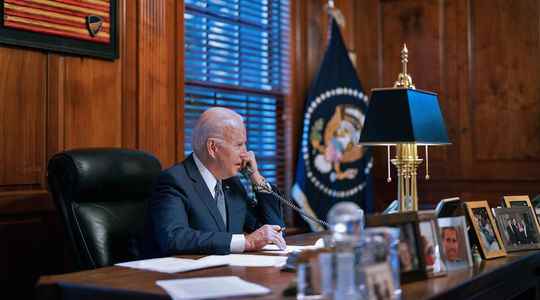In his memoirs, Joe Biden writes: “Ukrainians have been on an exciting and sometimes dreadful roller coaster last year, and I feel like I have shared their fate.” He alludes to the 2014 revolution and the annexation of Crimea by Moscow, which he followed closely as Barack Obama’s vice-president. Strangely, since then, it’s like Captain Haddock’s band-aid, he can’t manage to get rid of Ukraine. This country located thousands of kilometers from Washington has not ceased, over the past eight years, to interfere in his career.
When Russia invaded Crimea in 2014, to the surprise of the White House, Joe Biden pushed Barack Obama to quickly supply arms to the Ukrainians. The president, who fears escalation with Moscow, is slow to blame Putin. He sends his trusty Joe to the area, telling him not to “promise the Ukrainian government too much.” “We are not going to send the 82nd Airborne“, he told him, referring to the famous parachute division. The vice-president visited the country six times and focused on reforms and the fight against corruption.
He makes it an almost personal fight, judging by the place he gives to Ukraine in Promise Me, Dad, his Memoirs. Maybe because it’s a way to fulfill childhood dreams. From a young age, Biden writes, he always wanted to “try to change things.” Saving Ukrainian democracy is also a bit of his political legacy, at the end of his long career. His relatives warn him: if he gets too involved, he risks paying for it politically, since it will “necessarily be a defeat for the West”. But, he adds, “I didn’t really care. There was an important principle at play: big countries cannot crush smaller ones”.
“Exceptionally qualified to manage this crisis”
Three years later, Ukraine invites itself into the 2020 presidential campaign and threatens to make it lose the elections. Hunter, his youngest son, whose run-ins with drugs and questionable dating have made him the black sheep of the family, in 2014 became a member of the board of directors of Burisma, a gas group based in Kiev. He is paid 50,000 dollars (45,000 euros) a month, probably because his father is in charge of the Ukrainian dossier at the White House. All of this smacks of conflict of interest, even though there is nothing illegal about it.
Joe Biden, meanwhile, is pushing to get Ukraine’s notoriously corrupt attorney general fired. Moreover, the International Monetary Fund (IMF) and several countries of the European Union are also pleading for the dismissal of the prosecutor. But the Republicans, Donald Trump in the lead, hammer another thesis: if Biden wants to stop the career of the magistrate, it is to prevent him from investigating the company Burisma which pays Hunter Biden, who, according to them, has something to hide…
Once Biden is elected, it is again because of Ukraine that his presidency is turned upside down. “The crisis is reshaping the perception of the president and his priorities,” said Timothy Naftali, historian at New York University. He who had planned to devote himself to socio-economic problems and the rivalry with China is now monopolized by the tragedy of Kiev – he devoted the first twelve minutes of his speech on the state of the Union to it. “He is exceptionally qualified to manage this crisis. We haven’t had a president since Bush Sr. with such experience in foreign policy,” continues Timothy Naftali.
But it is a perilous position. He must support Ukraine without starting a Third World War. Nor alienate the American electorate. For now, Congress, including the Republicans, seems to be behind him. Joe Biden is however very aware that the face-to-face with Putin will not be painless for public opinion. The inflation that has weighed on its popularity rating will worsen with the rise in the price of oil. “The question remains of how important foreign policy will be in the next election, observes Douglas Knner, a specialist in political institutions at Cornell University. George HW Bush was the most popular of presidents after the first Gulf War in 1991. He lost his re-election in 1992 to Bill Clinton.”
